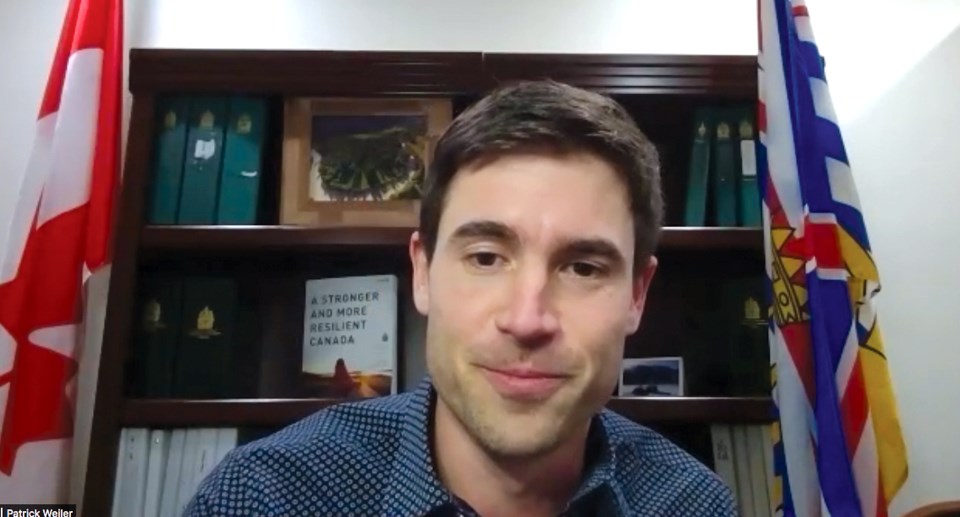About 20 local government and non-profit representatives met with West Vancouver-Sunshine Coast-Sea to Sky Country MP Patrick Weiler virtually on Feb. 9 to make their requests as the Trudeau government continues its Canada-wide pre-budget consultations.
Federal support for housing and economic recovery emerged as top priorities, with requests revealing how the pandemic has shaped needs on the Sunshine Coast.
In his opening remarks, Weiler said the federal government is “developing the details” for stimulus investments of up to $100 billion over the next three fiscal years. “This stimulus will help accelerate our economic recovery and it will be deployed at a time when the virus is under control and the economy is able to effectively absorb it,” he said.
He said he wants the budget to “reflect the varied and distinct issues that impact the Sunshine Coast,” including possible subsidies for the tourism and arts sectors, increased funding for affordable housing and rental projects, and new supports for children and seniors.
Housing
Virtually every speaker spoke to the ongoing housing crisis.
Resource Centre co-chair Pat Hunt offered a grim example of the problem, describing “a nurse’s house so mould-ridden she was living in her car with her dog.”
Sechelt Mayor Darnelda Siegers said because of a lack of housing, temporary short-term solutions such as hospital and shelter beds “are being turned into long-term housing stock.” Assisted living spaces are needed, too, she said. She also pointed to a “dire need” for mental health and addictions services and care facilities.
Gibsons Mayor Bill Beamish called out the lack of shelter spaces in the town and asked for solutions to address housing scarcity for front-line workers, such as a tax exemption relative to housing costs.
Sechelt and District Chamber of Commerce chair John Henderson called workforce housing the most important priority among members, while Colin Stansfield, executive director for the Sunshine Coast Regional Economic Development Organization, said “housing is the single greatest impediment to just and sustainable economic development in our region,” and asked for more access to low-cost capital so local governments can respond.
Hunt also turned to a letter from the centre’s legal advocate, Ken Carson, to reveal the growing urgency.
Carson said he’s been working on 12 legal disputes with the Residential Tenancy Branch since the start of 2021, affecting 30 tenants on the Coast. “The extreme shortage of alternative, affordable, rental housing for tenants who are forced to move is enormously distressing to my clients and overwhelming to me,” he said. “Affordable rental units are just disappearing.”
Economic recovery
Continued need for federal funds to support local businesses as the pandemic wears on came loud and clear from Janice Iverson, executive director for Community Futures Sunshine Coast.
She said the branch is among the top five in B.C. of getting funds to businesses through the Regional Relief and Recovery Fund (RRRF).
The branch was approved for $4.2 million on top of its $6-million loans portfolio, and 60 more clients have been added over the pandemic, doubling the clientele between Egmont and Gibsons.
While the majority of those clients are “cushioned” with federal support, said Iverson, “more than likely the majority of our local businesses will not be able to convert to debt without a very, very high risk put on to them.”
Stansfield also asked for support for Community Futures. “What they were able to do needs to continue to be enabled and ultimately doubled down on in this next budget,” he said.
Weiler said he was “excited” about the prospect of adding a new BC Regional Development Agency, as well, which will serve rural communities. “We have a population of over five million and we have one office,” he said, noting Atlantic Canada has half the population and 28 offices.
While the pandemic has forced many to turn to non-profits for support, local governments are relying on them for data and other resources, said several attendees, who asked for consistent funding.
Resource Centre’s Hunt suggested a renewable three-year funding program “to stabilize essential not for profits as they recover from the COVID nightmare.”
Siegers supported the request, adding local organizations such as the Seniors Planning Table offer “invaluable” information to local governments that informs their decisions. “All of the non-profits, they really do fill the gaps in rural areas,” she said.
Policing
Beamish requested that the federal government provide a grace period of at least one year before the town is required to pay for additional RCMP services once its population hits 5,000 people.
“That’s a $750,000 to $1 million taxation bill that will start in April of 2022,” he said, adding COVID-19 forced council to reduce reserve payments to decrease the tax burden on residents.
The public is asked to provide input on the budget by taking a survey, open until Feb. 19 at letstalkbudget2021.ca.



